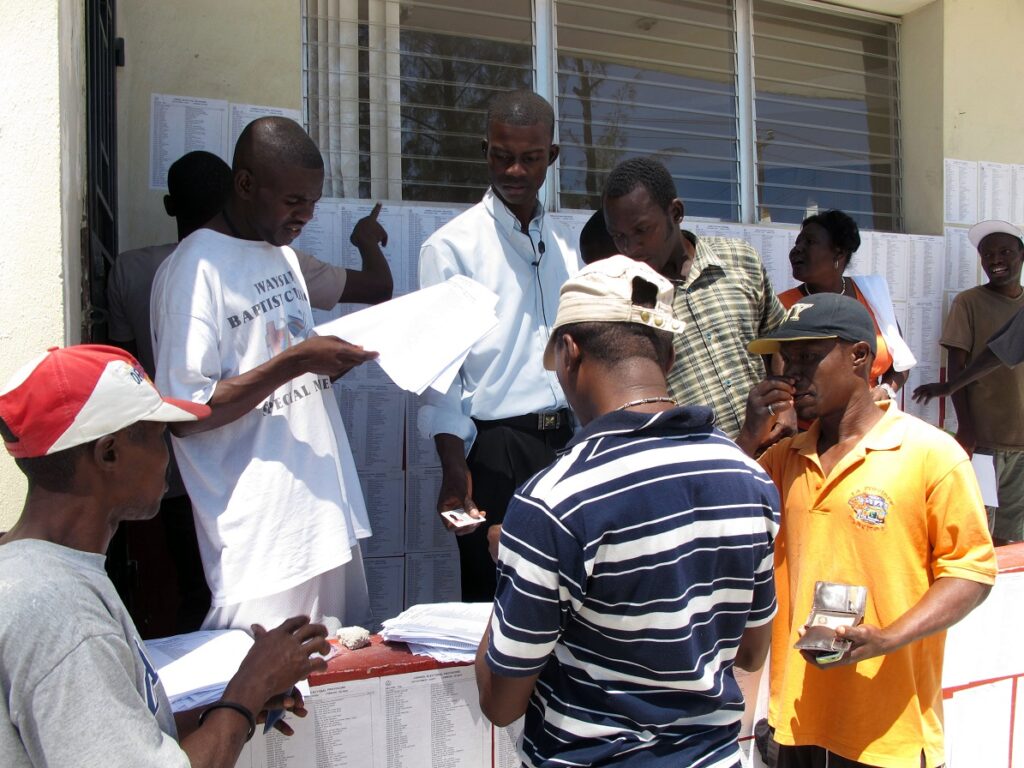Menu
Close
Haiti has been facing a major political crisis since 2018. It is mainly a crisis of the legitimacy of the public authorities, which has gradually deteriorated. This deterioration can be seen in (1) the dysfunction of parliament in January 2020, (2) the end of the mandate of local authorities in the same year, (3) the complicity and powerlessness of the police in the face of the terror of armed gangs besieging the Haitian capital, (4) the end of the presidential mandate of Jovenel Moïse on February 7, 2021, who remained in power until his assassination on July 7 of the same year, (5) the end of the mandate of the principal judges at the Cour de Cassation (the highest instance of the judiciary), and (6) the unconstitutional appointment of a set of judges by the former de facto Prime Minister, Ariel Henry.
Faced with this institutional vacuum, a wide-ranging consultation process resulted in a political agreement signed on August 30, 2021 between the main sectors of national life, political parties and groupings on mechanisms for resolving the crisis. Implementation of this political agreement, commonly referred to as the “Montana Accord” (named after the hotel where it was concluded), was blocked by the de facto government of Ariel Henry, with the support of a diplomatic network that set itself up as Haiti’s guardian under the influence of Washington. Finally, Ariel Henry resigned at Washington’s request. In this context of institutional vacuum, no political force can claim to have the legitimacy necessary to ensure the country’s political leadership. It is therefore a crisis of hegemony.
On April 25, 2024, a 9-member Council formed from a political consensus facilitated by CARICOM, was invested with presidential functions to fill the institutional vacuum. The Council is constituted in the spirit of a “delicate balance” of forces. It is a space for struggle between different forces (in terms of political agenda and ideological vision) committed to leading the political transition in a collegial manner. With less than a week to go before the installation of the Presidential Council, four of the seven members with voting rights on the Council have formed a bloc that seeks, to the detriment of the previously defined mechanism, to impose the formation of the provisional government and the institution responsible for organizing the next elections. This entails a risk of an implosion of the presidential council, which would contribute to prolonging the disarray of the Haitian people in the face of the exactions of armed gangs. Indeed, if the formation of the government and the electoral institution is not taken on by the other three members of the Presidential Council, the whole political transition process could be derailed. In this context, patriotic and progressive forces face two major challenges: (1) to prevent mafia forces from seizing the Presidential Council in order to reproduce themselves in power and prolong the crisis; (2) to shift the political struggle from the terrain of criminal violence to that of democratic struggles (claiming struggles, elections, etc.). Consequently, the forthcoming elections represent a major challenge for social and political forces seeking a lasting solution to the cycle of crises the country has been facing since 1986.

Poll workers assist voters in finding their polling places. Photo credit Vichinterlang

Showcasing stories of Caribbean organizations at the foreground of the struggle against disaster capitalism in the Caribbean. Our network of participants in the Greater Caribbean region connect, learn, share their hands on responses to the impacts of the twin threats of the climate crisis and disaster capitalism in our region.
WAVE (Progressive Reform Movement)
Global Challenges Research Fund
Open Society Foundations
All Rights Reserved – strongercaribbeantogether.org 2022
All Rights Reserved – strongercaribbeantogether.org 2022
In the tumultuous aftermath of disasters, it is easy to feel isolated and alone, but you are not.
We, a network of Caribbean-wide community organizers who stand in solidarity with those affected the twin threats of the climate crises and disaster capitalism, a phenomenon that exacerbates the suffering of vulnerable communities.
We want you to know that your stories matter. We are here to listen, to support, and to amplify your voices.
We believe that together, we can challenge the forces of disaster capitalism and advocate for more sustainable, inclusive and equitable decision-making.
Join us in solidarity. Share your experiences and let’s build strong communities that thrive together.
As the wider world braces for the climate change, Caribbean communities are already struggling with its effects. Small local communities, small scale farmers and coastal communities are disproportionately affected. Political decisions, power dynamics and laws often compound the catastrophes and silence bottom up solutions.
There are ways in which you can help.